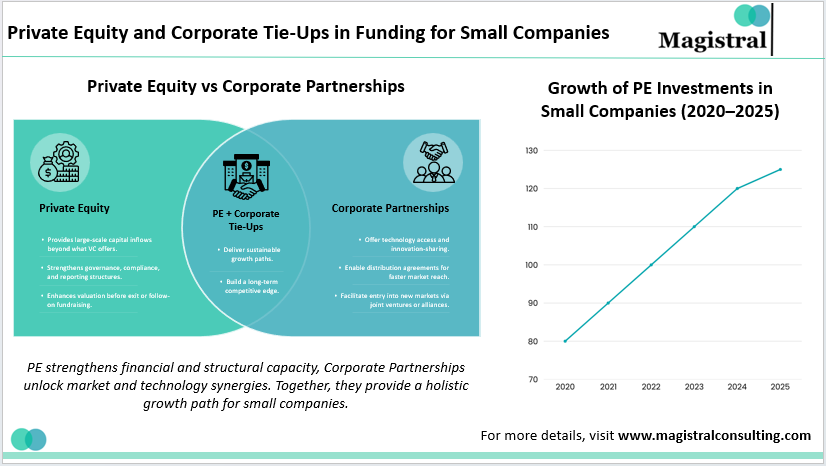Small businesses are the backbone of job growth and economic development. Yet, many founders experience challenges when attempting to access funding for small companies, which inhibits growth and scale of operations. The funding market in 2025 provides many more funding options such as digital lending, equity financing, venture capital and alternative finance models. Therefore, but more so, with some understanding of the market and allowing for the evolution of trends, it will provide entrepreneurs and decision-makers with strategic insights into accessing and acquiring capital and to grow their companies sustainably.
Funding for Small Companies through Bank Loans
Bank loans are a reliable source of funding for small companies, since bank loans are regulated and predictable, however access is limited because of credit requirements and collateral. In 2025, banks are very willing to engage with start-ups and are modernizing their onboarding to use fintech and digital tools to assess and approve loans faster for all borrowers but especially micro and small businesses in North America and Asia.
Access Requirements
To qualify for a loan, banks look for strong credit score, complete financial statements and a strong business plan that will assess eligibility loans and risk.
Pros of Bank Loans
Routine repayment schedules and large amounts that the business can use to purchase fixed assets and inventory.
Cons of Bank Loans
High interest rates and strict collateral requirements are barriers to most small businesses.
Shifts in 2025
The new technology used today and going forward means faster loans, and microloans and unique loan products are available to small businesses that are looking to create unique businesses.
Funding for Small Companies via Venture Capital
In 2025, venture Capital investing in small company s reached $400 billion in the world; however, the number of deals decreased because demand for deals has outpaced the appetite for investment despite a tough economic environment. Today, 95% of venture capital is being allocated to small or mid-ticket deals in areas such as AI, fintech, health tech, agritech, electric vehicles, hyperlocal delivery services, and extenuating economic environments. In terms of geographic scope, North America represented 70% of this funding; Asia 20%; and Europe 17%.

Funding for Small Companies via Venture Capital
Investor Expectations
VC firms investing in small companies are looking for start-ups with scalable business models and at least $2.5 in revenue generated annually.
Advantages of VC Funding
Investment firms not only provide capital, but they also come with solid mentorship and relationships within the industry, and strategy, to catalyse growth.
Limitations of VC Funding
Dilution of equity and sharing control is a drawback to some founders when it comes to limitations imposed on them by the investor.
The 2025 Outlook
While mega deal has decreased, investment remains strong in innovative sectors as VC continues to develop transformative next-generation start-ups.
Alternative Funding for Small Companies
The advent of alternative financing has certainly impacted the funding options for small businesses. Alternative financing models, such as revenue-based financing (RBF), crowdfunding, government grants and digital lending are on the rise.
Crowdfunding Platforms
Crowdfunding is used to provide 10% of startup funding and allows entrepreneurs to validate their ideas and obtain seed capital by selling directly to consumers and supporters.
Angel Investments
Angel investors provide entrepreneurs with early-stage funding and advice as they arise with gaps in the capital structure from banks and venture capitalists.
Government Schemes
Grants, from $50,000-$1.5 million USD, continue to provide innovation driven startups access to funding from grant programs around the world.
Revenue-Based Financing
RBF has earmarked growth of 70.9% from 2023-2024, with a valuation of $5.78 billion, and projected RBF to value $41.8 billion by 2028. It is a flexible repayment model wherein an RBF investor cares about a return on their investment based on company revenue, which alleviates the issues and stress associated with fixed loan repayments.
Digital Lending
Digital lending facilitated more than 10% increase in business applications, thereby providing business owners more access to working capital, as well as much quicker turnaround times for loan approvals.
Private Equity and Corporate Tie-Ups in Funding for Small Companies
Private equity and corporate partnerships will serve as key growth capital sources for small companies in 2025. Unlike venture capital, which tends to focus on early-stage innovation, private equity targets businesses that demonstrate operational maturity and stability. This class of investors is best positioned to support small firms with a proven track and looking to scale, who at the same time require larger capital and strategic guidance.
The Scale of PE Investment
Private equity investments into small companies exceeded $120 billion in 2024, demonstrating sustained confidence in this space despite volatile markets. That momentum has carried into 2025, as investors see small firms as resilient and capable of delivering high returns with the right support.
Strategic Advantages of Private Equity
Larger capital inflows as compared to venture capital.
Operational improvements and governance structures that enhance efficiency.
Market expansion and investor-backed scaling through global partnerships.
Improved exit or follow-on fundraising valuations.
Corporate Tie-Ups and Partnerships
Small firms stand to benefit the most from the synergistic partnerships between a small and large firm. The partnership can encompass co-marketing initiatives, distribution agreements, and technology licensing deals which in turn would offer the small business technology, new markets, and funding.
Why Private Equity and Partnerships are Vital in 2025
The hurdles small businesses face today, such as complicated supply chains, regulatory constraints, and increasing costs of acquiring customers are even more intense in the face of stiff competition. Such obstacles are tackled more effectively by PE as well as corporate tie-ups where capital is coupled with operational know-how to achieve what cannot be done through debt financing or angel investments—offering a viable path to growth.

Private Equity and Corporate Tie-Ups in Funding for Small Companies
Navigating the Future of Funding for Small Companies
In 2025, funding for small companies does not seem inherently one dimension. The entrepreneurs who will succeed will be those entrepreneurs who combine traditional channels, like bank loans, with new models of finance such as venture capital, crowdfunding, and revenue-based financing. Therefore, a hybrid form of finance will optimize a company’s capital structure, balance risk, and promote sustainable growth.
Small companies are increasingly acknowledging that resilience requires multiple streams of funding. By combining bank loans, private equity sources, grants, and alternative sources, companies are developing a ‘capital base’ that supports long-term growth regardless of how the economy is performing.
Magistral Consulting supports this process helping small companies become more appealing to investors by providing the information and resources to attract them. The firm supports hybrid capital strategies through data-driven analytics, increases profitability by providing outsourced services for processes that generate income, and offer a range of fundraising services that include access to investor databases, outreach programs, tailored financial models, and due diligence reports that establish credibility with capital providers.
While sustaining the company through finances is important in 2025, even more important is how small companies invest the right mix of capital and execute on their strategy for growing their companies. There are many options available and partner companies like Magistral can help small companies convert their financing challenges into pathways for future scale and success.
About Magistral Consulting
Magistral Consulting has helped multiple funds and companies in outsourcing operations activities. It has service offerings for Private Equity, Venture Capital, Family Offices, Investment Banks, Asset Managers, Hedge Funds, Financial Consultants, Real Estate, REITs, RE funds, Corporates, and Portfolio companies. Its functional expertise is around Deal origination, Deal Execution, Due Diligence, Financial Modelling, Portfolio Management, and Equity Research
For setting up an appointment with a Magistral representative visit www.magistralconsulting.com/contact
About the Author

Prabhash Choudhary is the CEO of Magistral Consulting. He is a Stanford Seed alumnus and mechanical engineer with 20 + years’ leadership at Fortune 500 firms- Accenture Strategy, Deloitte, News Corp, and S&P Global. At Magistral Consulting, he directs global operations and has delivered over $3.5 billion in client impact across finance, research, analytics, and outsourcing. His expertise spans management consulting, investment and strategic research, and operational excellence for 1,200 + clients worldwide
FAQs
What is the most common source of funding for small companies?
How do venture capitalists support small companies beyond money?
Are government schemes reliable for funding for small companies?
What role does crowdfunding play in funding for small companies?
Can small companies combine different funding models?